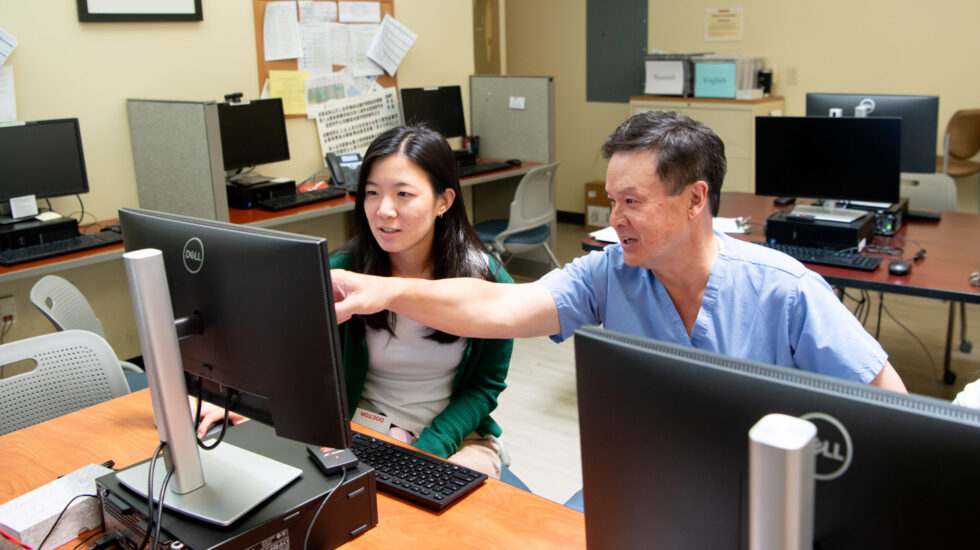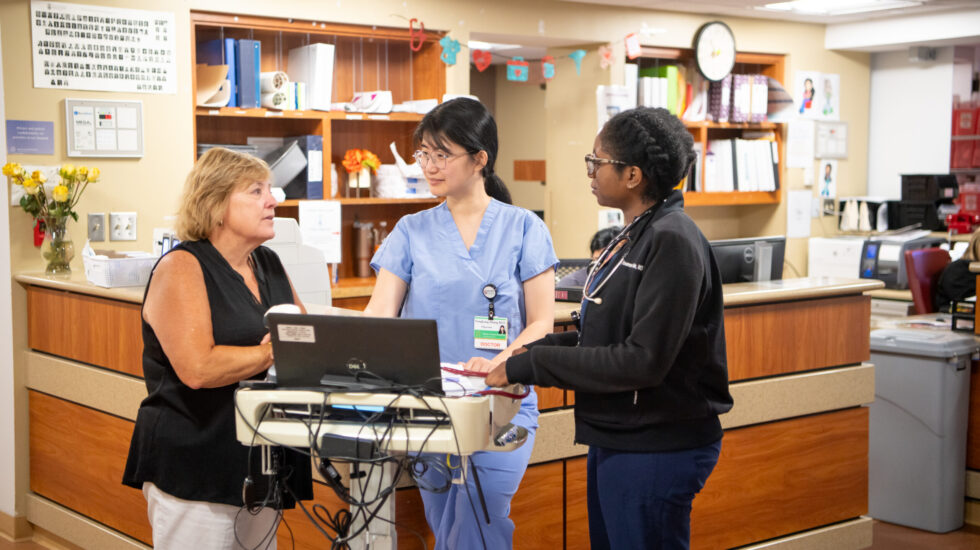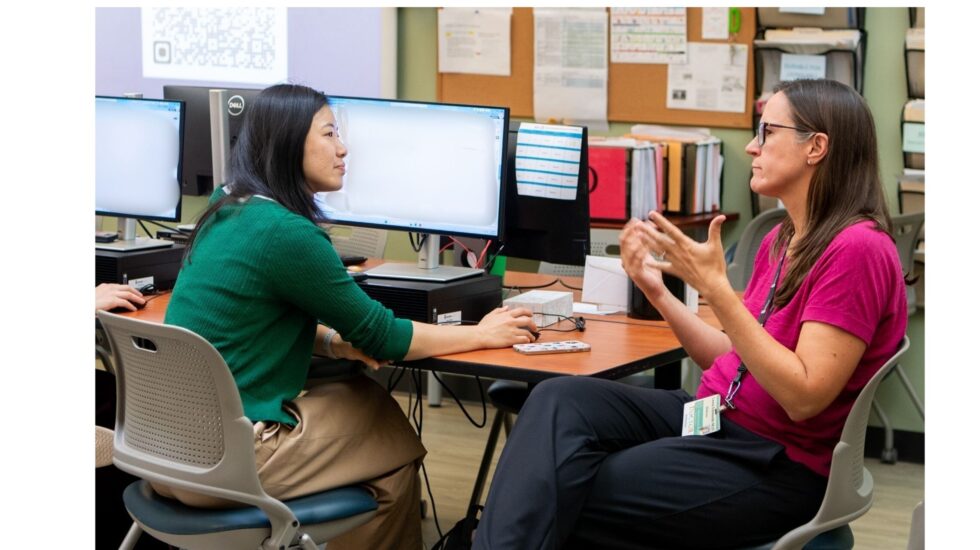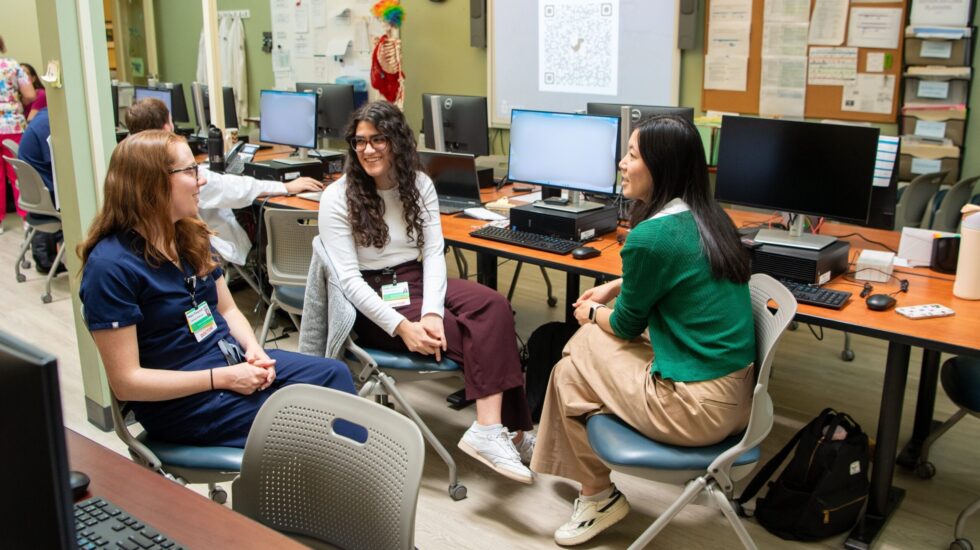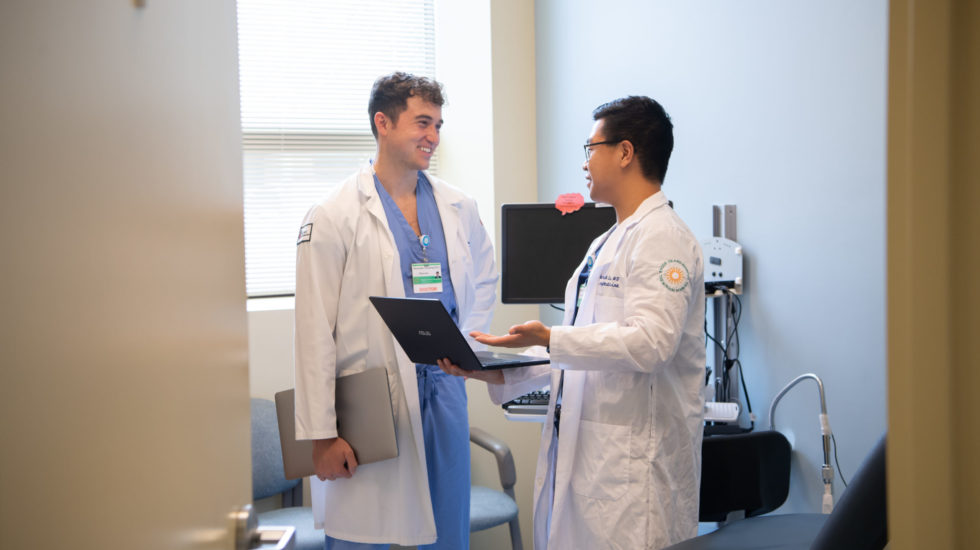- Home
- Who We Are
- From Our Chairman
- From Our Program Director
- Program Directors
- Chief Residents
- Resident Support Staff
- Preliminary Internal Medicine Residents
- Categorical Internal Medicine Residents
- GIM/Primary Care Residents
- Med Peds Residents
- BMHA
- Graduate Career Choices
- Brown University/Lifespan GME
- Arts & Humanities in Residency
- Research
- How To Apply
- Training Programs & Tracks
- Why Providence?
Ambulatory Medicine
Ambulatory Curriculum
The majority of healthcare in the United States occurs in the ambulatory setting and most residency graduates will have careers involving an ambulatory component regardless of whether they choose a specialist or generalist career pathway. Our ambulatory curriculum is therefore designed to create a strong foundation in ambulatory medicine and to provide our residents with the skills necessary to be successful ambulatory clinicians and leaders regardless of their intended career choice. The goals of the ambulatory curriculum are to prepare residents to:
- Deliver high quality, evidence-based, comprehensive primary care to a panel of patients
- Appreciate how to navigate a complex medical system and work within a multidisciplinary team to coordinate the care of their patients
- Develop the knowledge and skills required to diagnose and manage the most common ambulatory clinical conditions and preventive care needs of their patients
- Gain experience in a community-based ambulatory setting that will supplement their continuity clinic experience and specifically prepare them for their intended career pathway
In addition to core ambulatory rotations, our ambulatory curriculum is broken down into three main components: 1) the continuity clinic experience, 2) community-based teaching experience (second site clinic), 3) a common ambulatory curriculum, and 4) additional clinical experiences in which residents can elect to participate. Please explore a brief sampling of what Brown has to offer in each of these areas in more detail below.
Continuity Clinic Experience
Residents’ continuity clinic starts during July of intern year and forms the foundation for their ambulatory clinical experience. Currently residents see patients weekly in their continuity clinic except when on vacation, night float, and ICU rotations and more frequently when on several of their core ambulatory rotations. When we transition to an X+Y schedule in July 2026, residents will spend 2 out of every 8 weeks in an immersive ambulatory experience including multiple sessions per week of continuity clinic. Brown offers two sites for continuity clinic. Both sites provide residents with the opportunity to manage a panel of patients under the mentorship of experienced internal medicine physicians. Additionally, each site has an electronic medical record system that allows residents access to data on their practice patterns, quality metrics, and patient outcomes. Each clinic site includes unique opportunities for our residents!
Center for Primary Care
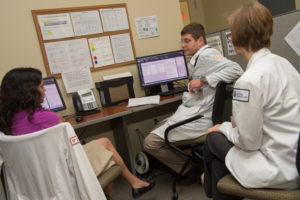 The Center for Primary Care (CPC) is located a short 1.5 miles from RIH and is the largest of our continuity clinic sites. The CPC is a Patient-Centered Medical Home and a safety net clinic for patients in the surrounding neighborhood. We care for a population of patients ages 19 and older, with approximately 80% of patients being either on public insurance or uninsured. The population is racially, ethnically, and linguistically diverse, with over 60 languages represented. The CPC uses a team-based approach to provide comprehensive care to patients utilizing medical assistants, social workers, clinical pharmacists, diabetes educators, nutritionists, RNs, LPNs, nurse care managers, community health workers, referral coordinators, and onsite Spanish interpreters. Additional resources include onsite psychiatry, onsite specialty care, an onsite laboratory, and a unique team trained to help patients with social determinants of health. Residents with their continuity clinic at the CPC can participate in an interdisciplinary comprehensive care clinic to help care for their most complex patients. The CPC is also home to various other clinical teaching opportunities including Recovery Clinic, Transitions Clinic, Procedure Clinic, Refugee Clinic, and the Reproductive and Gender Health Clinic which are available to any residents.
The Center for Primary Care (CPC) is located a short 1.5 miles from RIH and is the largest of our continuity clinic sites. The CPC is a Patient-Centered Medical Home and a safety net clinic for patients in the surrounding neighborhood. We care for a population of patients ages 19 and older, with approximately 80% of patients being either on public insurance or uninsured. The population is racially, ethnically, and linguistically diverse, with over 60 languages represented. The CPC uses a team-based approach to provide comprehensive care to patients utilizing medical assistants, social workers, clinical pharmacists, diabetes educators, nutritionists, RNs, LPNs, nurse care managers, community health workers, referral coordinators, and onsite Spanish interpreters. Additional resources include onsite psychiatry, onsite specialty care, an onsite laboratory, and a unique team trained to help patients with social determinants of health. Residents with their continuity clinic at the CPC can participate in an interdisciplinary comprehensive care clinic to help care for their most complex patients. The CPC is also home to various other clinical teaching opportunities including Recovery Clinic, Transitions Clinic, Procedure Clinic, Refugee Clinic, and the Reproductive and Gender Health Clinic which are available to any residents. VA Clinic
The Providence VA Primary Care Clinic is a patient-centered medical home responsible for almost 20,000 Veterans. It is divided into several teams comprised of the Primary Care Provider, Clinic Nurse, Clinic LPN, medical assistants, Social Worker, Nutritionist, Clinical Pharmacist, and Mental Health Provider who work together to improve patient access to care with a focus on chronic disease prevention and management. Residents will have the opportunity to care for both men and women who have served this county, many of whom have disabilities related to their military service. Residents are responsible for complex patients under the supervision of an assigned preceptor for the entire three years. In addition to the routine face-to face and telephone appointments, the VA has a sophisticated scheduling and video conferencing system for patients and their caregivers through a special portal. Residents will have the opportunity to care for their patient panel during clinic and between clinic visits through a remote portal that can be conveniently accessed from their home computer.
Community-Based Teaching Experience (Second Site Clinic)
During the PGY2 and PGY3 years, residents spend an additional half day per week in another site, designed to complement their continuity clinics and broaden residents’ ambulatory exposure. Faculty volunteers are carefully selected for this effort based upon their interests and teaching abilities. Residents and community-based faculty are carefully paired in a one-on-one, longitudinal relationship based on each resident’s identified area of interest. Training sites include private offices around Providence and nearby communities, Providence Ambulatory Health Center Network (a nationally recognized consortium of neighborhood health centers), the VA Firm clinics, Brown Student Health Services, as well as selected subspecialty office practices. Second Site has been one of the most popular clinical experiences for our residents and has been a wonderful opportunity for residents to work with a faculty member in a longitudinal relationship that can also result in research partnerships, career mentorship, or a letter of recommendation. As we transition to an X+Y schedule in July 2026, we will continue with our community-based teaching program during Y weeks and elective rotations.
Common Ambulatory Curriculum
In addition to continuity clinic, all residents will participate in the following components of the ambulatory curriculum.
Pre-Clinic Conference
 Currently, faculty members at both clinic sites present a topic weekly prior to each continuity clinic session. Presentations are created by residents in partnership with faculty, and are curated by a team of faculty members in order to ensure they are high quality, participatory, and highly relevant to our residents, and cover topics relevant to ambulatory medicine. Topics include how to manage various ambulatory conditions, reviews of quality metrics and how to manage a panel of patients, and introductions to various aspects of systems-based care. As we transition to our X+Y schedule in July 2026, the material currently presented in pre-clinic conference will shift to other teaching venues and the format for our clinic-associated conferences will shift towards case-based discussions.
Currently, faculty members at both clinic sites present a topic weekly prior to each continuity clinic session. Presentations are created by residents in partnership with faculty, and are curated by a team of faculty members in order to ensure they are high quality, participatory, and highly relevant to our residents, and cover topics relevant to ambulatory medicine. Topics include how to manage various ambulatory conditions, reviews of quality metrics and how to manage a panel of patients, and introductions to various aspects of systems-based care. As we transition to our X+Y schedule in July 2026, the material currently presented in pre-clinic conference will shift to other teaching venues and the format for our clinic-associated conferences will shift towards case-based discussions. Ambulatory Rotations
All residents will participate in several core rotations that feature a combination of didactics focused on ambulatory education and a more immersive experience in residents’ continuity clinics. These rotations include the intern Quality Improvement Continuity Clinic (intern QICC) rotation (occurs in two 2-week blocks), the intern endocrinology outpatient experience, the intern geriatrics rotation, the PGY2 Quality Improvement Continuity Clinic (QICC) rotation, and Ambulatory Block rotations in the PGY2 and PGY3 years.
Additional Clinical Experiences
Brown offers a variety of additional ambulatory clinical experiences in which residents can elect to participate while on ambulatory rotations and electives. Listed below is just a sampling of some of the experiences available to residents:
Procedure clinic
The Center for Primary Care offers a dedicated Procedure Clinic for patients requiring office-based procedures. Our Procedure Clinic also offers a valuable training opportunity for residents to rotate through and receive a structured educational experience. During their time in the clinic, residents are trained to perform these procedures under the supervision of an experienced physician. Educational materials are provided as part of the structured curriculum to enhance their learning experience. The focus of procedural education is to help residents become more comfortable addressing common musculoskeletal complaints and learn essential office-based procedures. Our most commonly requested procedures are orthopedic corticosteroid injections (E.g. knee joint, subacromial shoulder, trochanteric bursitis, trigger finger, deQuervain’s tenosynovitis), family planning procedures (E.g. Nexplanon insert/removals, IUD insert/removals) and occasional dermatologic procedures (E.g. I&Ds, skin tags, biopsies, toenail removals).
Reproductive and Gender Health Clinic
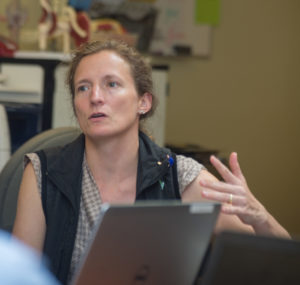 The Center for Primary Care’s Reproductive and Gender Clinic provides consultation visits for CPC patients of all genders. Common reasons for consultation include: hormone-related issues (menopause, hypogonadism and gender-affirming care); contraception and family planning (full spectrum including IUDs, contraceptive implants, medication abortion); vaginitis; and trauma-informed pelvic examinations for patients who do not want to obtain their pap smear/cervical cancer screening with their regular PCP. The clinic is staffed by Dr Mindy Sobota and 1-2 resident doctors committed to women’s health.
The Center for Primary Care’s Reproductive and Gender Clinic provides consultation visits for CPC patients of all genders. Common reasons for consultation include: hormone-related issues (menopause, hypogonadism and gender-affirming care); contraception and family planning (full spectrum including IUDs, contraceptive implants, medication abortion); vaginitis; and trauma-informed pelvic examinations for patients who do not want to obtain their pap smear/cervical cancer screening with their regular PCP. The clinic is staffed by Dr Mindy Sobota and 1-2 resident doctors committed to women’s health.Refugee Clinic
Historically Rhode Island has been a resettlement hub for many refugee families. Our Refugee Clinic performs an initial refugee health assessment visit within a month of the new refugee’s arrival and is a great opportunity for residents interested in refugee health, global health, primary care and infectious disease. Many of these patients elect to continue receiving their primary care at the Center for Primary Care (CPC).
Transitions Clinic
The Transitions Clinic program provides a variety of coordinated medical and social services for formerly-incarcerated patients. These are patients who tend to be some of the sickest and most indigent patients in Rhode Island and for whom continuity of care outside of the prison setting is necessary to sustain health and increase access to care. Care is delivered through an innovative multidisciplinary team including Community Health Workers with special attention to addressing the social determinants of health.
Recovery Clinic
The Recovery Clinic at the Center for Primary Care provides coordinated office-based opioid treatment and social services for patients who are in recovery from opioid use disorder and other substance use disorders. Residents will work with a multidisciplinary team including an attending, addiction fellow, social worker, pharmacist, program coordinator and community health worker in Recovery Clinic.

